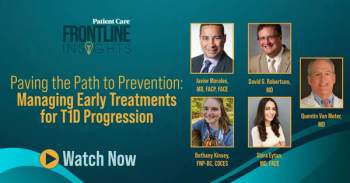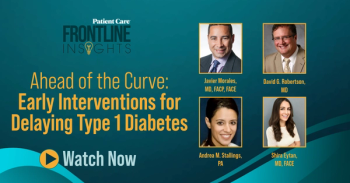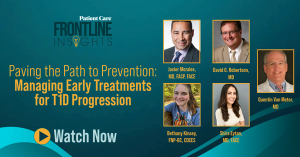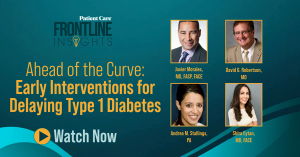
Panelists discuss how early identification of Type 1 diabetes through screening programs, combined with emerging therapies like teplizumab, offers new opportunities for intervention and improved patient outcomes in at-risk populations.

Panelists discuss how early identification of Type 1 diabetes through screening programs, combined with emerging therapies like teplizumab, offers new opportunities for intervention and improved patient outcomes in at-risk populations.

Panelists discuss how patient selection for teplizumab therapy requires screening for specific autoantibodies and stages of Type 1 diabetes, followed by a standardized 14-day outpatient infusion protocol with careful monitoring for side effects.

Panelists discuss how teplizumab, the first FDA-approved disease-modifying therapy for Type 1 diabetes, can delay disease onset by targeting CD3+ T cells and preserving beta cell function in high-risk individuals.

Panelists discuss how islet autoantibody testing serves as a critical screening tool for identifying Type 1 diabetes risk, with tests detecting antibodies against insulin, GAD65, IA-2, and ZnT8 proteins being the most clinically validated markers.

Panelists discuss how patient selection for teplizumab therapy requires careful screening for autoantibody positivity and preserved C-peptide function, followed by a 14-day outpatient infusion process that needs close monitoring for cytokine release syndrome and other potential adverse effects.

Panelists discuss how teplizumab demonstrated efficacy in clinical trials by delaying type 1 diabetes onset in high-risk patients.

Panelists discuss how teplizumab binds to T cells and modifies their function to preserve beta cell function, potentially delaying type 1 diabetes onset in at-risk individuals by an average of 2-3 years.

Panelists discuss how screening for autoantibodies can help identify individuals at risk for type 1 diabetes before symptoms develop, enabling earlier intervention and potentially delaying disease onset.

Panelists discuss how delaying intervention during Stage 2 Type 1 diabetes increases the risk of diabetic ketoacidosis and complications at diagnosis, while also potentially accelerating beta cell destruction and reducing the window for preservation therapies.

Panelists discuss how Type 1 diabetes progresses through distinct stages, from initial autoimmunity with normal blood glucose (Stage 1), to dysglycemia without symptoms (Stage 2), to clinical diagnosis with symptoms (Stage 3), marking critical intervention points for treatment and management.

Panelists discuss how screening for Type 1 diabetes should focus on identifying high-risk individuals through family history, genetic markers, and autoantibody testing, while emphasizing the importance of early detection to prevent diabetic ketoacidosis at diagnosis.

Panelists discuss how delayed intervention in stage II type 1 diabetes can accelerate β cell destruction, leading to more severe clinical onset, increased risk of serious complications like diabetic ketoacidosis, and poorer long-term outcomes.

Panelists discuss how type 1 diabetes progresses through distinct stages, beginning with asymptomatic autoantibody presence, followed by dysglycemia, and ultimately manifesting with classic symptoms like excessive thirst, frequent urination, and unexplained weight loss.

Panelists discuss early testing with autoantibody screening for type 1 diabetes in at-risk individuals, particularly those with family history or genetic predisposition, to avoid DKA at diagnosis and allow time for patient and family preparation.

Panelists discuss the burden of living with type 1 diabetes, including high levels of stress and anxiety and talk about how they help patients manage the daily requirements.

Panelists discuss how Type 1 diabetes imposes significant physical, emotional, and financial burdens on patients through the lifelong need for insulin therapy, blood glucose monitoring, lifestyle modifications, and management of potential complications.

Published: December 21st 2024 | Updated:

Published: December 19th 2024 | Updated:

Published: December 21st 2024 | Updated:

Published: December 23rd 2024 | Updated:

Published: December 21st 2024 | Updated:

Published: December 21st 2024 | Updated: